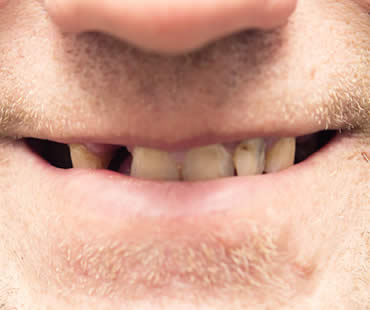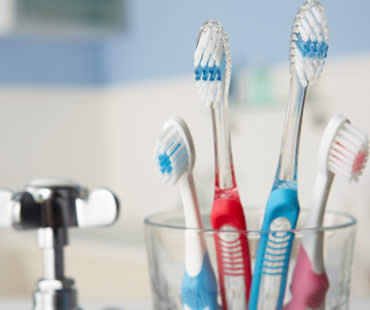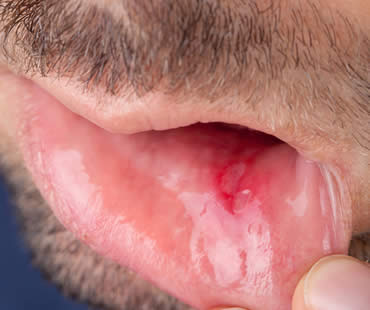
by Dr. Adkins | May 7, 2021 | Blog, Dental Information, Dental Topics 2
As we age, our birthdays tend to bring new oral health issues along with them. It’s a fact of life that our teeth and gums are impacted by our age. Here are some common problems to watch for, and suggestions for treatment.
Gum disease:
Regular dental checkups and cleanings are vital to avoid gum disease. The first stage is called gingivitis and it’s reversible. If untreated, it can lead to a very serious advanced stage called periodontitis. You may not experience signs of gum disease, so practicing good oral hygiene and seeing your dentist are the best ways to keep it at bay.
Tooth sensitivity:
If cold or hot foods cause you discomfort, you have a common problem called tooth sensitivity. It can result from decay, worn fillings, gum disease, broken teeth, or exposed roots. Your dentist may recommend toothpastes designed to reduce sensitivity, or other treatments based on the cause of your problem. Good oral hygiene can help with sensitivity also.
Missing teeth:
If you are missing any teeth, it not only looks unappealing but it can also affect your ability to eat and speak. Your other teeth may move, and bone loss can occur. Discuss treatment options with your dentist because you might be able to restore your smile. Bridges, implants, and dentures are a few of the dental advances that might help.
Dry mouth:
Medicines and some health conditions often cause your mouth to be overly dry. Having a dry mouth is uncomfortable, but it also can seriously impact your teeth and gums. Without saliva to naturally clean your mouth, the risks of tooth decay and other problems increase. Ask your dentist to look for signs of decay, and to help you identify the cause for your dry mouth. Be sure to tell your dentist about your medical history and medications.
Oral cancer:
Oral cancer can include your gums, lips, cheeks, tongue, jaw, throat, or soft palate. It sometimes begins with just a tiny spot or swollen area, so regular dental checkups can help catch this disease early. A variety of treatment options are available, but early detection makes a difference.
If you live in the McDonough area contact us today

by Dr. Adkins | Jan 29, 2021 | Blog, Dental Information, Dental Topics 2
The foods and drinks you consume affect more than your waistline. Your diet provides you with the nutrients you need and impacts your overall health, and also affects the health of your teeth and gums. Let’s see what the choices you make in your diet mean to your oral health.
Nutrients
If you don’t include certain nutrients in your diet, it’s harder for the tissues in your mouth to fight infection. This can promote gum disease, which can lead to tooth loss if not treated properly and early. Experts suggest that gum disease advances faster and can become more severe in people who don’t have a nutritious diet. Ask your doctor for suggestions for a healthy diet full of helpful nutrients.
Balanced diet
Your goal should be to eat a variety of foods from the five major food groups. These include whole grains, fruits, vegetables, lean protein, and low-fat dairy items. It’s also important to drink plenty of water.
Sugar
Sugary foods and drinks are enemies for your oral health, because sugar is proven to contribute to tooth decay. When plaque comes into contact with sugar in your mouth, it causes acid to attack your teeth and lead to decay. Limit the amount of sugar you consume by reading the nutritional labels on foods and drinks, and opt for items that are lowest in sugar. Soft drinks, candy, pastries, and cookies are common sources of sugar.
Snacking
Avoid snacking in between meals, and choose healthy foods like fruit or cheese when you do snack. When you eat foods as part of a meal, it is less harmful to your teeth than eating lots of snacks throughout the day. This is a result of more saliva being released during a meal, which helps wash food from your mouth and lessen the impact of harmful acids.
Dental care
Practice good oral hygiene like regular flossing and brushing with fluoride toothpaste, and visit your dentist regularly for checkups and cleanings.
Schedule your appointment at our McDonough dental office

by Dr. Adkins | Mar 20, 2020 | Blog, Dental Information, Dental Topics 2
Chances are you would be disgusted at the thought of leaving your eating utensils on your bathroom counter exposed to germs, and never washing them but continuing to eat with them. This is essentially what you’re doing if you leave your toothbrush sitting out, and never sanitize or change it. Let’s talk about how to keep your toothbrush from being a germ-infested threat to your health.
Your toothbrush can be contaminated by bacteria, saliva, blood, and food particles with each use. Even after you rinse it with water, your toothbrush may appear clean but germs linger on the bristles. Some of the sources of bacteria on your toothbrush include:
- Your mouth, which transfers germs to your toothbrush during use.
- The environment, because bathrooms are often the most contaminated room in your house.
- The packaging, since toothbrushes aren’t sold in sterile packages they can arrive with germs already on them.
Here are some tips to guard your toothbrush from germs:
- Before and after you brush your teeth, wash your hands to get rid of germs.
- Rinse your toothbrush well with water, and then allow it to air dry.
- Store the toothbrush upright so that water can drain from it while drying.
- Consider storing your toothbrush in a dry area outside of the bathroom, away from humidity and toilet spray
- Replace your toothbrush every 3-4 months, or more often if you notice worn bristles.
- Do not share your toothbrush with anyone.
- Do not soak your toothbrush in disinfectant or mouthwash, which can lead to cross contamination
- Do not bother microwaving your toothbrush or running it in the dishwasher, because these tactics may damage your brush.
Schedule your appointment at our McDonough dental office

by Dr. Adkins | Mar 1, 2019 | Blog, Dental Information, Dental Topics 2
Pregnancy brings many kinds of excitement and joy to a mother’s life, but gum problems aren’t one of them. Pregnancy gingivitis not only causes gum trouble, it can also lead to higher risks for preterm labor and problems with the newborn baby. If you are pregnant and notice swelling or inflammation of your gums, you might have pregnancy gingivitis. It results from plaque buildup that irritates your gums, and can harbor bacteria that gets into your body. The bacteria can travel to your uterus and affect your pregnancy and unborn child. How can you avoid pregnancy gingivitis?
Oral hygiene
Brush and floss your teeth properly. Try to brush after all meals and snacks, especially those high in sugars or starches. See your dentist for frequent cleanings, aiming for two to three times during your pregnancy. This will remove more plaque from your teeth that you can at home, serving to lower your risk for plaque buildup.
Education
Consult your dentist before, during, and after your pregnancy. You will learn how to best care for your mouth, and what to watch for in case a problem does arise.
Nutrition
Maintaining a healthy diet during pregnancy will not only benefit your overall health and that of the baby, but will also limit your sugar intake which promotes plaque formation.
Dental care
Try to have dental procedures performed before you become pregnant. Some emergency procedures are safe during pregnancy, but it is best to have treatment done before pregnancy.
Bacteria control
Avoid sharing food and utensils so that you don’t transfer bacteria from person to person. Your goal is to limit the amount of bacteria in your mouth as much as possible.
Xylitol gum
Chewing sugarless gum promotes saliva, which help equalize the acids in your mouth and fight plaque buildup. The ingredient xylitol has been shown to help prevent bacteria from being able to stick on your teeth, therefore fighting tooth decay.
If you need a dentist in McDonough contact us today

by Dr. Adkins | Nov 23, 2018 | Blog, Dental Information, Dental Topics 2
Sores in or around your mouth are painful and unsightly. They can have a variety of causes, such as infections, irritation from orthodontics or dentures, and symptoms of another health problem. Here are descriptions of the most common mouth sores.
Cold sores
Also called fever blisters, cold sores appear around your lips, nose, or chin. These extremely contagious, fluid-filled blisters are caused by the herpes simplex virus type 1. Once you are infected with primary herpes, the virus remains in your body and occasionally flares up. Cold sores typically heal by themselves in about a week. Over-the-counter topical anesthetics may help, and your dentist may prescribe antiviral medications to reduce occurrences.
Canker sores
These small ulcers only appear inside your mouth. They are white or gray with a red border, and are not contagious. Experts are unsure of the exact cause, but suspect they are related to immune system deficiencies, viruses, or bacteria. Canker sores usually heal on their own in a week or two. It is advised to avoid spicy, hot, or acidic foods that can irritate the sore. Over-the-counter mouthwashes or topical anesthetics may help, and your dentist may prescribe antibiotics if a secondary infection occurs.
Thrush
Oral thrush, or candidiasis, is a fungal infection occurring when the yeast Candida albicans reproduces in great amounts. Common with denture wearers, it most often appears in people with weakened immune systems such as the elderly or ill. People with dry mouth or who are on antibiotics are also at greater risk for thrush. The key to controlling candidiasis is treating the condition that causes it. Dentures should be cleaned regularly and removed at bedtime, and dry mouth should be treated in an effort to lessen that condition.
Leukoplakia
Leukoplakia are thick, white patches that grow on the inside of your cheeks, gums or tongue. Common with tobacco users, they result from irritations from habits like chewing on your cheek or wearing ill-fitting dentures. Leukoplakia are also associated with oral cancer. Treatment focuses on addressing the reasons for the lesion, such as quitting smoking or replacing dentures.
If you live in the McDonough area contact us today







 770-957-5214
770-957-5214  E-Mail Us
E-Mail Us 
